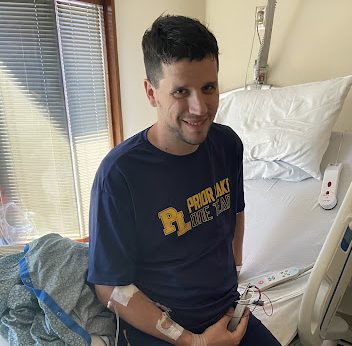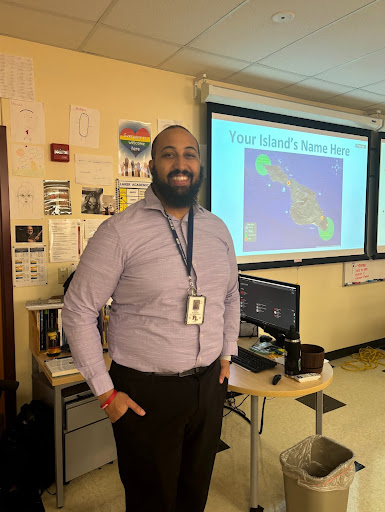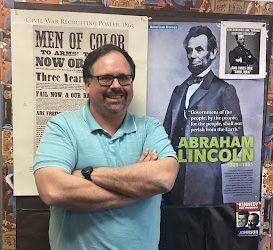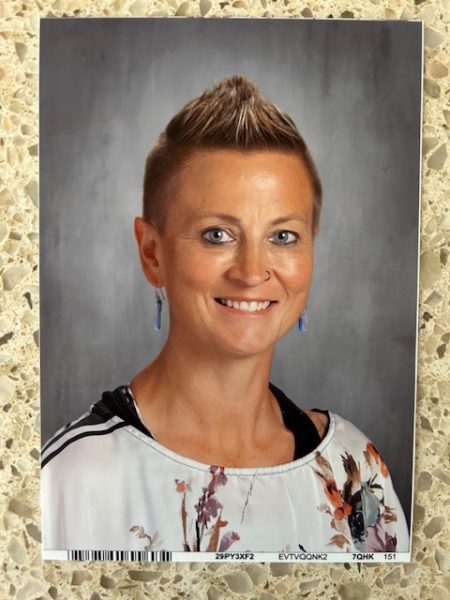Having a change of heart
Roughly half a million people a year end up in the hospital primarily due to dehydration.
Dehydration is easier to get than most people think, and these are the exact thoughts that were going through Mr. Walker’s brain. Early in the morning during high school football camp, Mr. Walker started to experience dizziness and blurred vision.
This didn’t raise too many alarm bells considering it was a hot July day, and he had just golfed 18 holes a few days prior. He sat down, drank some water, and hoped this would relieve his symptoms. It did not.
“I felt as if someone had reached their hand through the middle of my spine, grabbed my muscles and twisted,” said English teacher and 10th-grade football coach Mr. Walker.
Mr. Walker was suffering from what is called an aortic dissection. An aortic dissection is when the inner layer of the body’s main artery (aorta) tears. He was rushed to the hospital by his best friend, and the doctor confirmed this diagnosis.
So many thoughts rushed to Mr. Walker’s head in such a short period of time. However, none of these thoughts were more prominent than the fact that he didn’t want to die, and remembering his father.
At a very young age, Mr. Walker was made aware of a condition called Marfan Syndrome that he inherited from his father. Marfan Syndrome is a genetic disorder that causes the connective tissue that shapes and supports many parts of the body to be weaker than the average person’s. Marfan Syndrome also presents itself in physical ways, and Mr. Walker has many of these features.
This syndrome that Mr. Walker has been living with played a major role in the passing of his father. He also had an aortic dissection. However, his wasn’t caught soon enough.
He was transferred by ambulance to the University of Minnesota Medical Center and was immediately prepped for surgery. The doctor told Mr. Walker that he reviewed the scans of his heart, and he had a 95% chance of living.
At this point in time, Mr. Walker had two thoughts running through his brain.
“I was either going to go to sleep and wake up, or I was going to go to sleep and not wake up,” said Mr. Walker. Mr. Walker knew that it was out of his control, and he put his full faith in the doctors. Then he fell asleep.
Concern and worry are understatements for how Mr. Walker’s family and friends were feeling. Mr. Walker’s life-long best friend, Mr. Koonce, who was the one who rushed him to the hospital, felt a lot of concern, but that concern was outlined by hope.
“If he wasn’t already going into surgery, I would have been a lot more concerned, but knowing the fact that he was with surgeons and getting the help that he needed eased my mind,” said Mr. Koonce, a Science teacher at Prior Lake High School.
“I woke up the next morning at around 9 AM, alive,” said Mr. Walker. He woke up with a feeling of relief but a realization that he never got to say goodbye to his two children. Thankfully for Mr. Walker, his family members won’t have to explain to his young children why they won’t see their dad anymore.
The 8-hour surgery was a success. The doctors replaced one of the valves that was connected to his heart with a metal one, and they added new piping. They put in a plastic tube where the tear was, and now his blood flows through a plastic tube.
Mr. Walker’s whole life changed in the span of a day.
“I went from taking zero pills, to taking 5 different pills a day,” said Mr. Walker.
The recovery ahead was also daunting for Mr. Walker. Daily activities caused an overwhelming amount of exhaustion.
“It is going to take around a year before I start feeling like myself again,” said Mr. Walker.
Although Mr. Walker’s life has changed forever, “it didn’t change his outlook on life,” said Mr. Koonce. “He’s a person that people enjoy being around and his optimism is one of the reasons for that. I’m really happy that he didn’t lose that.”








